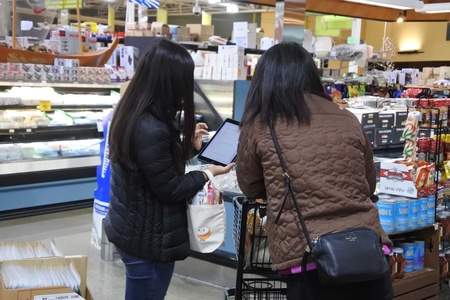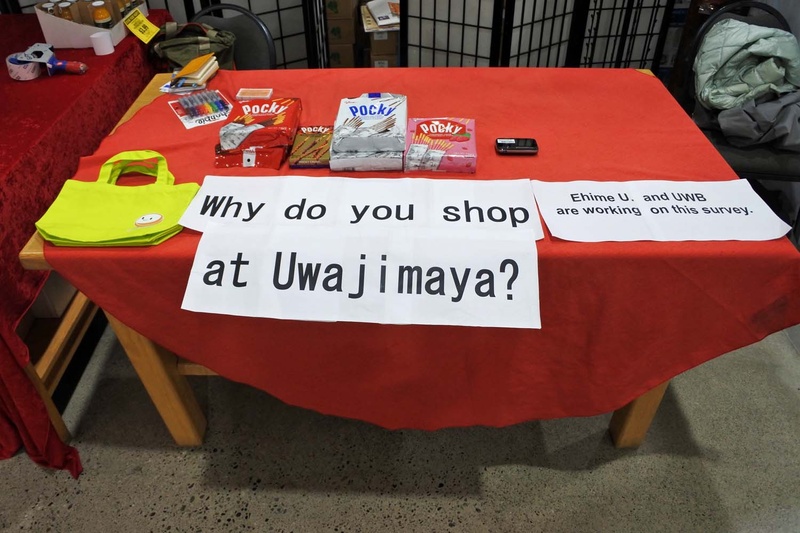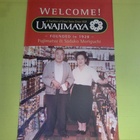Starting out as a small grocery store, Seattle-based supermarket chain Uwajimaya has a 90-year history and is run by the Moriguchi family, who have roots in Ehime Prefecture. As a Japanese-owned, family-run chain, Uwajimaya has been a frequent subject of coverage in local media, and the reasons for its success and growth have also attracted attention from Japanese universities and are currently the subject of research.
The group working on this project is led by Associate Professor Ryoko Sato of the Ehime University Regional Creation Research Center and the Department of Humanities and Social Sciences, Faculty of Law and Letters. Last year, Sato and her team conducted a questionnaire survey of Uwajimaya customers and interviews with the Moriguchi family in Seattle, and will be conducting related research in the United States again this year.
Ehime University launched a research group called the Glocal Regional Studies Unit in April 2016 with the aim of "academically analyzing the mechanisms by which values, technologies, and systems that originate from the local place of Ehime and move across borders spread and take root globally."
One such project is the Uwajimaya Study in Seattle, which has a reach from Ehime to America. In addition to this, four other case studies are underway: "Research on Fukuoka Masanobu and Natural Farming," "Research on Matsuyama POW Camp," and "Research on Transboundary Ocean Nomads."
Taking advantage of the local advantages that only a regional university can offer, this is a unique research project that takes a micro-to-macro perspective and examines the connections between each case and how they can develop "globally."
In the "Seattle Uwajimaya Research" conducted by Associate Professor Sato and his team, they are using the keywords "Japanese immigrants," "grocery stores," and "Asian food culture" to explore the factors that led to the development and success of Uwajimaya, run by the Moriguchi family from Yawatahama, Ehime Prefecture, in America, as well as what Ehime brought to America and the influence it had. Furthermore, they foresee that their research will serve as a reference for regional companies expanding overseas.
With this in mind, in September 2016, we first went to Uwajimaya and interviewed Tomio Moriguchi, the management team, related staff, and people with knowledge of the history about the store's current situation and history.
We also visited various local supermarkets in the Seattle area, as well as Asian and ethnic grocery stores, to gather basic data for the next survey of Uwajimaya customers.
Based on this information, in March 2017, a questionnaire survey was conducted on customers visiting Uwajimaya's Seattle and Bellevue stores on the weekends.
The premise was to focus on how Americans other than Japanese and Japanese-Americans perceive the issue. The specific methods of the research and analysis were led by Associate Professor Satoru Mikami of the Faculty of Law and Letters.
For the survey, customers were asked to complete their shopping in the store as soon as possible and answer questions by looking at the tablet screen.
In addition to questions about customer trends, such as "Where are you from?", "How often do you visit the store?", and "What was your purpose for visiting the store?", we also asked questions about the respondent's connection to Japan, such as "Do you know what kind of person the founder is (e.g., is he of Japanese descent)?" and "Do you know anywhere in Japan where Uwajima, the name of the store, is located?"

In addition, at the request of Ehime Prefecture, we also asked questions to gauge awareness of Ehime Prefecture products such as "Jakoten."
The detailed results of the analysis have not yet been made public, but after completing his investigation, Associate Professor Sato offered the following impressions:
"It seems that Asian customers tend to rate Uwajimaya highly when compared to other Asian stores. I got the impression that it was frequented by relatively high-class people. Also, from feedback I heard around town, I got the impression that word of mouth about the quality of Japanese products and Uwajimaya's products has spread quite widely."
In connection with their research on Uwajimaya, Associate Professor Sato and his colleagues plan to conduct research on a Japanese grocery supermarket chain in California this spring.
© 2018 Ryusuke Kawai







